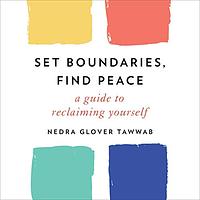Take a photo of a barcode or cover
I needed this book for myself. This was one of the more important books I read in 2021. It helped me realize I have porous boundaries and how I can work on changing that. I plan to purchase a copy of this so I can take notes in the margins, highlight sections, carry it around as a comfort item. Okay, I am exaggerating a little with that last point, but there is useful advice in here I want to be able to go back to since setting boundaries is not a "one and done" sort of process.
informative
medium-paced
i think a lot of people need to read this lmao. i mostly resonated with the needing to mind your own business and not offering advice unless it’s explicitly asked for.
7/10 or 3/5 & audiobook
7/10 or 3/5 & audiobook
Overall, I found this unhelpful at best and slightly harmful at worst.
I follow Nedra Tawwab on ig and generally found her posts around boundaries helpful to aid daily reflections, as someone who is actively working on my boundaries. I understand that she is a licensed social worker but primarily has qualifications and experience in therapy, so I was looking forward to more of her writing and insights.
Her insights, I realise however, may be best given as a therapist, where she would work with each person's individual needs in depth and length, or as an ig influencer, where her soundbites can resonate with more people. Somehow, they do not translate well into a book, where to write one, one would need nuance, clear writing, deeper exploration of a topic, and consideration of a larger audience with different expectations.
The book outlined a few aspects of boundaries to be discussed - the impact of poor boundaries, types of boundaries, boundary violations, expressing your boundaries, and so on. It seems like it was meant to be a quick and simple guide for you to be able to practice your boundaries. This is also unfortunately where the book fails. Interpersonal relationships are never that simple; boundaries are but one out of many aspects of navigating relationships with others and yourself. It is important to consider nuance when trying to distill this down to a simple guide.
For example, one of the situations given were that someone's father had a drinking problem and consistently is verbally abusive and disruptive when he drinks at family events. The suggestion given was for the son to set the boundary for his father not to drink at family events. I am curious to know what else has been tried - some of which has been discussed in the example - but I would like to know if the father has sought help? Has the family decided that having an alcohol-free event might be helpful to his health, or just not inviting him to these events, and if so, what were the reasons for not employing these strategies instead? Is the father aware and pro-active in suggesting his own behavioural changes or not? How has this worked over time - were there lapses, did they use and discard strategies? Has anyone considered a more drastic boundary (like cutting him off) and what were some considerations and pains to that? Are there any safety issues such as retaliation or escalation of violence?
Another aspect of interpersonal relations quite egregiously missing in this guide is the consideration of power dynamics. Tawwab did briefly mention that if you are in an abusive situation, you may find it hard to draw boundaries and to seek professional support, but I feel like this only shows that her extensive experience with working with individuals as a therapist may be limited to a very particular demographic.
In my work with domestic violence survivors, we had to strategise on what the best ways are to keep a survivor safe and yet allow them to regain some control over the situation, and the solutions that often come of that aren't perfect. I recall once that a mother had allowed herself to be shouted at daily rather than to take away her husband's alcohol because she knows that there will be an escalation of violence.
It becomes very clear that such negotiations happen and discussions on boundaries should happen in these areas once you take into account the lived realities of many people in very different situations. Someone who is disempowered by systemic issues will have to make these concessions daily.
Another example where this was not considered. A given example of a micro breach was when a cashier started bagging someone's groceries in an aggressive way. While I agree that mishandling of one's possessions is a breach of boundaries, it was a really oddly specific example, and it is not mindful of the fact that often it is service staff whose boundaries get breached everyday by the sheer fact that they are not the ones in a position of power in this interaction.
Finally, it was a little confusing as to where one's boundaries end and where dictating another's behaviour begins. Some of the suggestions Tawwab gave were things like stating that someone can only have three drinks. There was no context to this and also, you cannot dictate someone else's behaviour. I was confused as to whether I should head this advice or not before deciding to disregard it completely.
Honestly would not recommend.
I follow Nedra Tawwab on ig and generally found her posts around boundaries helpful to aid daily reflections, as someone who is actively working on my boundaries. I understand that she is a licensed social worker but primarily has qualifications and experience in therapy, so I was looking forward to more of her writing and insights.
Her insights, I realise however, may be best given as a therapist, where she would work with each person's individual needs in depth and length, or as an ig influencer, where her soundbites can resonate with more people. Somehow, they do not translate well into a book, where to write one, one would need nuance, clear writing, deeper exploration of a topic, and consideration of a larger audience with different expectations.
The book outlined a few aspects of boundaries to be discussed - the impact of poor boundaries, types of boundaries, boundary violations, expressing your boundaries, and so on. It seems like it was meant to be a quick and simple guide for you to be able to practice your boundaries. This is also unfortunately where the book fails. Interpersonal relationships are never that simple; boundaries are but one out of many aspects of navigating relationships with others and yourself. It is important to consider nuance when trying to distill this down to a simple guide.
For example, one of the situations given were that someone's father had a drinking problem and consistently is verbally abusive and disruptive when he drinks at family events. The suggestion given was for the son to set the boundary for his father not to drink at family events. I am curious to know what else has been tried - some of which has been discussed in the example - but I would like to know if the father has sought help? Has the family decided that having an alcohol-free event might be helpful to his health, or just not inviting him to these events, and if so, what were the reasons for not employing these strategies instead? Is the father aware and pro-active in suggesting his own behavioural changes or not? How has this worked over time - were there lapses, did they use and discard strategies? Has anyone considered a more drastic boundary (like cutting him off) and what were some considerations and pains to that? Are there any safety issues such as retaliation or escalation of violence?
Another aspect of interpersonal relations quite egregiously missing in this guide is the consideration of power dynamics. Tawwab did briefly mention that if you are in an abusive situation, you may find it hard to draw boundaries and to seek professional support, but I feel like this only shows that her extensive experience with working with individuals as a therapist may be limited to a very particular demographic.
In my work with domestic violence survivors, we had to strategise on what the best ways are to keep a survivor safe and yet allow them to regain some control over the situation, and the solutions that often come of that aren't perfect. I recall once that a mother had allowed herself to be shouted at daily rather than to take away her husband's alcohol because she knows that there will be an escalation of violence.
It becomes very clear that such negotiations happen and discussions on boundaries should happen in these areas once you take into account the lived realities of many people in very different situations. Someone who is disempowered by systemic issues will have to make these concessions daily.
Another example where this was not considered. A given example of a micro breach was when a cashier started bagging someone's groceries in an aggressive way. While I agree that mishandling of one's possessions is a breach of boundaries, it was a really oddly specific example, and it is not mindful of the fact that often it is service staff whose boundaries get breached everyday by the sheer fact that they are not the ones in a position of power in this interaction.
Finally, it was a little confusing as to where one's boundaries end and where dictating another's behaviour begins. Some of the suggestions Tawwab gave were things like stating that someone can only have three drinks. There was no context to this and also, you cannot dictate someone else's behaviour. I was confused as to whether I should head this advice or not before deciding to disregard it completely.
Honestly would not recommend.
challenging
informative
inspiring
reflective
medium-paced
hopeful
informative
inspiring
fast-paced
This felt like the poor man’s Dean Spade - like yes, communication is important and you shouldn’t assume people know what you need/want. However, that’s all it had to say. Also, it felt like everything became « boundaries » and the book wasn’t working with a clear definition of what that word meant.
Excellent practical and useful tips. Understandable and approachable content, I will be returning to this book!
challenging
hopeful
informative
inspiring
reflective
medium-paced
This will definitely be a book I reach for when someone is struggling with boundary setting, burnout, overload… it’s written really clearly and offers really intentional info and solutions. Highly recommend.





